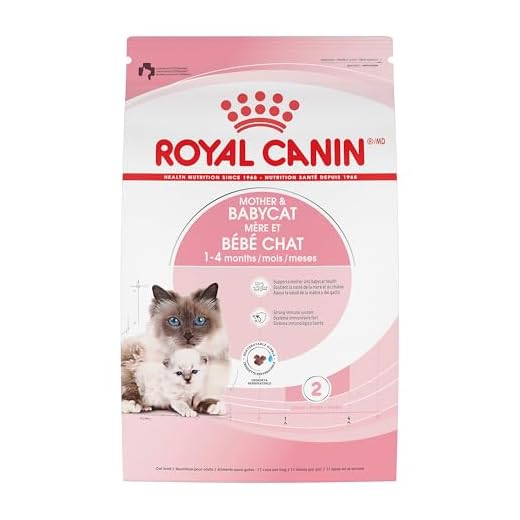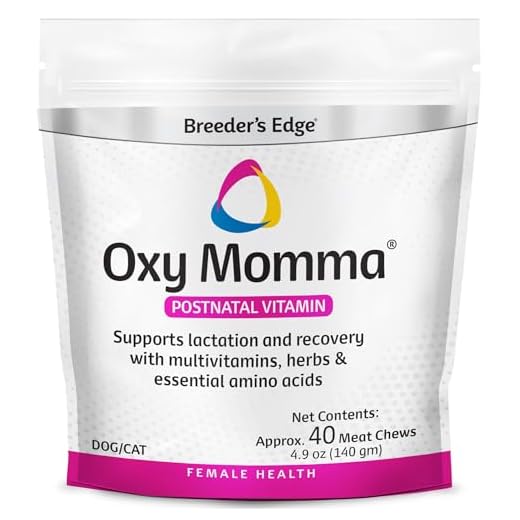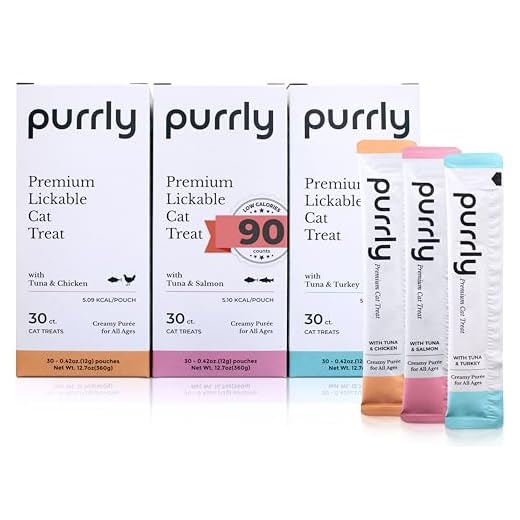



To enhance lactation, ensure the queen has a balanced diet rich in protein and fat. High-quality kitten food provides the essential nutrients for optimal nursing. Incorporate wet food to increase hydration and stimulate appetite, which is crucial during the nursing phase.
Regular feeding and maintaining a stress-free environment are equally important. Create a quiet, comfortable space for her and the kittens to bond, minimizing disturbances. This comforting atmosphere supports her natural instincts and helps increase her ability to nurse effectively.
Additionally, consider offering supplements like brewer’s yeast or omega-3 fatty acids, which can further support her health and milk supply. Always consult with a veterinarian before introducing any new supplements to ensure they are appropriate.
Increasing Nourishment for Kittens
Providing the right nutrition plays a key role in ensuring that a mother feline can adequately nourish her offspring. A balanced diet rich in protein is crucial. Look for high-quality cat food specifically formulated for nursing mothers. This food often contains higher fat and calorie content to meet the increased energy demands during this time.
Hydration Matters
- Ensure fresh water is always available. Hydration supports overall health and contributes to an adequate supply of nutrients.
- Consider incorporating wet food into her diet. It not only provides hydration but also enhances the palatability of her meals.
Regular Veterinary Check-ups
A veterinary professional can offer tailored advice and evaluate the health of both the mother and her kittens. If there are any concerns about her ability to care for her young, they can provide necessary interventions or supplements.
While focusing on nurturing, it’s also wise to consider other aspects of feline care. If you’re dealing with issues like how to prevent felines from soiling indoors, check out this guide. Additionally, be mindful of your surroundings; for instance, are fig trees toxic to felines? You can find more information on that here.
Understanding the Nutritional Needs of Nursing Cats
The key to ensuring that a mother feline thrives while caring for her kittens is a balanced and nutrient-rich diet. High-quality protein is paramount. Include chicken, turkey, or fish in her meals to support tissue repair and provide the energy needed during lactation.
Incorporate fats into her diet, as they are a concentrated source of energy. Look for omega-3 and omega-6 fatty acids, which can be found in fish oil or flaxseed oil. These nutrients contribute to the health of both the mother and her young.
Vitamins and minerals play a significant role in overall well-being. Calcium and phosphorus are crucial for bone health; ensure she has access to a premium cat food specifically formulated for nursing females. This type of food typically contains the right balance of minerals and vitamins.
Hydration is equally important. Fresh water should be available at all times; hydration aids in digestion and helps maintain milk quality. Wet food can also be an excellent option for increasing her fluid intake.
Monitor her weight and adjust portions accordingly. If she seems to be losing weight, increase her food intake. A healthy, satisfied mother will naturally produce more nourishment for her kittens.
Techniques for Encouraging Increased Flow
One effective approach involves maintaining a consistent feeding schedule. Providing regular meals ensures that the body adapts and responds to the needs of the little ones. Offering high-quality, nutrient-dense food during this phase is critical. Look for options rich in protein and essential fatty acids.
Hydration and Comfortable Environment
Ensuring that fresh water is available at all times can significantly impact the process. Staying hydrated supports overall health and can enhance fluid production. Creating a warm and quiet space for nursing can reduce stress, allowing for a more relaxed experience that naturally aids in the flow.
Regular Physical Interaction
Engaging in gentle, loving interactions can also play a role. Petting and bonding with the little ones can stimulate certain hormones that promote fluid release. Encouraging the kittens to nurse frequently is another tactic to signal the body to increase supply, as the act of nursing itself can trigger further production.
Monitoring and Supporting the Health of the Nursing Queen
Regularly check the weight of the queen. A steady gain indicates well-being and adequate nourishment. If her weight drops, it’s a sign to reassess her diet and hydration.
Observe her behavior closely. A nursing female should be alert and engaged with her kittens. Signs of lethargy or disinterest may suggest underlying health issues that need addressing.
Ensure fresh water is always available. Hydration plays a key role in the wellness of the mother. Dehydration can lead to a decline in her overall health and affect her ability to care for her young.
Monitor her appetite. A healthy nursing queen will have a robust appetite. If she refuses food or shows a sudden change in eating habits, consult a veterinarian for advice.
Provide a quiet, comfortable space for her and the kittens. Reducing stress levels is crucial. A calm environment allows her to focus on nursing and caring for her litter.
Keep an eye on her coat condition. A shiny, well-groomed coat is often a good indicator of health. Dullness or excessive shedding might require a dietary evaluation.
Check for any signs of illness, such as vomiting or diarrhea. Any persistent symptoms should prompt an immediate consultation with a vet to rule out infections or other health concerns.
Regular veterinary check-ups are essential during this period. These visits can help catch potential issues early and ensure the queen is in peak condition to nurture her kittens.
To enhance lactation, ensure the queen has a balanced diet rich in protein and fat. High-quality kitten food provides the essential nutrients for optimal nursing. Incorporate wet food to increase hydration and stimulate appetite, which is crucial during the nursing phase.
Regular feeding and maintaining a stress-free environment are equally important. Create a quiet, comfortable space for her and the kittens to bond, minimizing disturbances. This comforting atmosphere supports her natural instincts and helps increase her ability to nurse effectively.
Additionally, consider offering supplements like brewer’s yeast or omega-3 fatty acids, which can further support her health and milk supply. Always consult with a veterinarian before introducing any new supplements to ensure they are appropriate.
Increasing Nourishment for Kittens
Providing the right nutrition plays a key role in ensuring that a mother feline can adequately nourish her offspring. A balanced diet rich in protein is crucial. Look for high-quality cat food specifically formulated for nursing mothers. This food often contains higher fat and calorie content to meet the increased energy demands during this time.
Hydration Matters
- Ensure fresh water is always available. Hydration supports overall health and contributes to an adequate supply of nutrients.
- Consider incorporating wet food into her diet. It not only provides hydration but also enhances the palatability of her meals.
Regular Veterinary Check-ups
A veterinary professional can offer tailored advice and evaluate the health of both the mother and her kittens. If there are any concerns about her ability to care for her young, they can provide necessary interventions or supplements.
While focusing on nurturing, it’s also wise to consider other aspects of feline care. If you’re dealing with issues like how to prevent felines from soiling indoors, check out this guide. Additionally, be mindful of your surroundings; for instance, are fig trees toxic to felines? You can find more information on that here.
Understanding the Nutritional Needs of Nursing Cats
The key to ensuring that a mother feline thrives while caring for her kittens is a balanced and nutrient-rich diet. High-quality protein is paramount. Include chicken, turkey, or fish in her meals to support tissue repair and provide the energy needed during lactation.
Incorporate fats into her diet, as they are a concentrated source of energy. Look for omega-3 and omega-6 fatty acids, which can be found in fish oil or flaxseed oil. These nutrients contribute to the health of both the mother and her young.
Vitamins and minerals play a significant role in overall well-being. Calcium and phosphorus are crucial for bone health; ensure she has access to a premium cat food specifically formulated for nursing females. This type of food typically contains the right balance of minerals and vitamins.
Hydration is equally important. Fresh water should be available at all times; hydration aids in digestion and helps maintain milk quality. Wet food can also be an excellent option for increasing her fluid intake.
Monitor her weight and adjust portions accordingly. If she seems to be losing weight, increase her food intake. A healthy, satisfied mother will naturally produce more nourishment for her kittens.
Techniques for Encouraging Increased Flow
One effective approach involves maintaining a consistent feeding schedule. Providing regular meals ensures that the body adapts and responds to the needs of the little ones. Offering high-quality, nutrient-dense food during this phase is critical. Look for options rich in protein and essential fatty acids.
Hydration and Comfortable Environment
Ensuring that fresh water is available at all times can significantly impact the process. Staying hydrated supports overall health and can enhance fluid production. Creating a warm and quiet space for nursing can reduce stress, allowing for a more relaxed experience that naturally aids in the flow.
Regular Physical Interaction
Engaging in gentle, loving interactions can also play a role. Petting and bonding with the little ones can stimulate certain hormones that promote fluid release. Encouraging the kittens to nurse frequently is another tactic to signal the body to increase supply, as the act of nursing itself can trigger further production.
Monitoring and Supporting the Health of the Nursing Queen
Regularly check the weight of the queen. A steady gain indicates well-being and adequate nourishment. If her weight drops, it’s a sign to reassess her diet and hydration.
Observe her behavior closely. A nursing female should be alert and engaged with her kittens. Signs of lethargy or disinterest may suggest underlying health issues that need addressing.
Ensure fresh water is always available. Hydration plays a key role in the wellness of the mother. Dehydration can lead to a decline in her overall health and affect her ability to care for her young.
Monitor her appetite. A healthy nursing queen will have a robust appetite. If she refuses food or shows a sudden change in eating habits, consult a veterinarian for advice.
Provide a quiet, comfortable space for her and the kittens. Reducing stress levels is crucial. A calm environment allows her to focus on nursing and caring for her litter.
Keep an eye on her coat condition. A shiny, well-groomed coat is often a good indicator of health. Dullness or excessive shedding might require a dietary evaluation.
Check for any signs of illness, such as vomiting or diarrhea. Any persistent symptoms should prompt an immediate consultation with a vet to rule out infections or other health concerns.
Regular veterinary check-ups are essential during this period. These visits can help catch potential issues early and ensure the queen is in peak condition to nurture her kittens.
To enhance lactation, ensure the queen has a balanced diet rich in protein and fat. High-quality kitten food provides the essential nutrients for optimal nursing. Incorporate wet food to increase hydration and stimulate appetite, which is crucial during the nursing phase.
Regular feeding and maintaining a stress-free environment are equally important. Create a quiet, comfortable space for her and the kittens to bond, minimizing disturbances. This comforting atmosphere supports her natural instincts and helps increase her ability to nurse effectively.
Additionally, consider offering supplements like brewer’s yeast or omega-3 fatty acids, which can further support her health and milk supply. Always consult with a veterinarian before introducing any new supplements to ensure they are appropriate.
Increasing Nourishment for Kittens
Providing the right nutrition plays a key role in ensuring that a mother feline can adequately nourish her offspring. A balanced diet rich in protein is crucial. Look for high-quality cat food specifically formulated for nursing mothers. This food often contains higher fat and calorie content to meet the increased energy demands during this time.
Hydration Matters
- Ensure fresh water is always available. Hydration supports overall health and contributes to an adequate supply of nutrients.
- Consider incorporating wet food into her diet. It not only provides hydration but also enhances the palatability of her meals.
Regular Veterinary Check-ups
A veterinary professional can offer tailored advice and evaluate the health of both the mother and her kittens. If there are any concerns about her ability to care for her young, they can provide necessary interventions or supplements.
While focusing on nurturing, it’s also wise to consider other aspects of feline care. If you’re dealing with issues like how to prevent felines from soiling indoors, check out this guide. Additionally, be mindful of your surroundings; for instance, are fig trees toxic to felines? You can find more information on that here.
Understanding the Nutritional Needs of Nursing Cats
The key to ensuring that a mother feline thrives while caring for her kittens is a balanced and nutrient-rich diet. High-quality protein is paramount. Include chicken, turkey, or fish in her meals to support tissue repair and provide the energy needed during lactation.
Incorporate fats into her diet, as they are a concentrated source of energy. Look for omega-3 and omega-6 fatty acids, which can be found in fish oil or flaxseed oil. These nutrients contribute to the health of both the mother and her young.
Vitamins and minerals play a significant role in overall well-being. Calcium and phosphorus are crucial for bone health; ensure she has access to a premium cat food specifically formulated for nursing females. This type of food typically contains the right balance of minerals and vitamins.
Hydration is equally important. Fresh water should be available at all times; hydration aids in digestion and helps maintain milk quality. Wet food can also be an excellent option for increasing her fluid intake.
Monitor her weight and adjust portions accordingly. If she seems to be losing weight, increase her food intake. A healthy, satisfied mother will naturally produce more nourishment for her kittens.
Techniques for Encouraging Increased Flow
One effective approach involves maintaining a consistent feeding schedule. Providing regular meals ensures that the body adapts and responds to the needs of the little ones. Offering high-quality, nutrient-dense food during this phase is critical. Look for options rich in protein and essential fatty acids.
Hydration and Comfortable Environment
Ensuring that fresh water is available at all times can significantly impact the process. Staying hydrated supports overall health and can enhance fluid production. Creating a warm and quiet space for nursing can reduce stress, allowing for a more relaxed experience that naturally aids in the flow.
Regular Physical Interaction
Engaging in gentle, loving interactions can also play a role. Petting and bonding with the little ones can stimulate certain hormones that promote fluid release. Encouraging the kittens to nurse frequently is another tactic to signal the body to increase supply, as the act of nursing itself can trigger further production.
Monitoring and Supporting the Health of the Nursing Queen
Regularly check the weight of the queen. A steady gain indicates well-being and adequate nourishment. If her weight drops, it’s a sign to reassess her diet and hydration.
Observe her behavior closely. A nursing female should be alert and engaged with her kittens. Signs of lethargy or disinterest may suggest underlying health issues that need addressing.
Ensure fresh water is always available. Hydration plays a key role in the wellness of the mother. Dehydration can lead to a decline in her overall health and affect her ability to care for her young.
Monitor her appetite. A healthy nursing queen will have a robust appetite. If she refuses food or shows a sudden change in eating habits, consult a veterinarian for advice.
Provide a quiet, comfortable space for her and the kittens. Reducing stress levels is crucial. A calm environment allows her to focus on nursing and caring for her litter.
Keep an eye on her coat condition. A shiny, well-groomed coat is often a good indicator of health. Dullness or excessive shedding might require a dietary evaluation.
Check for any signs of illness, such as vomiting or diarrhea. Any persistent symptoms should prompt an immediate consultation with a vet to rule out infections or other health concerns.
Regular veterinary check-ups are essential during this period. These visits can help catch potential issues early and ensure the queen is in peak condition to nurture her kittens.










